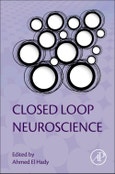Closed Loop Neuroscience addresses the technical aspects of closed loop neurophysiology, presenting the implementation of these approaches spanning several domains of neuroscience, from cellular and network neurophysiology, through sensory and motor systems, and then clinical therapeutic devices.
Although closed-loop approaches have long been a part of the neuroscientific toolbox, these techniques are only now gaining popularity in research and clinical applications. As there is not yet a comprehensive methods book addressing the topic as a whole, this volume fills that gap, presenting state-of-the-art approaches and the technical advancements that enable their application to different scientific problems in neuroscience.
Please Note: This is an On Demand product, delivery may take up to 11 working days after payment has been received.
Table of Contents
Theoretical Axis 1. Adaptive Bayesian methods for closed-loop neurophysiology 2. Information geometric analysis of neurophysiological data 3. Control theory for closed loop neurophysiology 4. Testing the theory of practopoiesis using closed loops 5. Local field potential analysis for closed loop neuromodulation 6. Online event detection requirements in closed-loop neuroscience 7. Closing Dewey's Circuit 8. Stochastic optimal control of spike times in single neurons 9. Hybrid systems neuroscience 10. Computational Complexity and the Function-Structure-Environment Loop of the Brain 11. Subjective Physics 12. Contextual emergence in neuroscience
Experimental Axis 13. Closed loop methodologies for cellular electrophysiology 14. Bidirectional Brain-Machine Interfaces 15. Real time movement prediction for closed loop neurotechnology 16. Adaptive brain stimulation for Parkinson's disease 17. Closed loop neuroprosthetics 18. Closed Loop Limbic Neurostimulation 19. Conscious brain-to-brain communication
Philosophical Axis 20. Philosophical aspects of closed loop neuroscience 21. Closed Loops in Neuroscience and Computation: What It Means and Why It Matters








